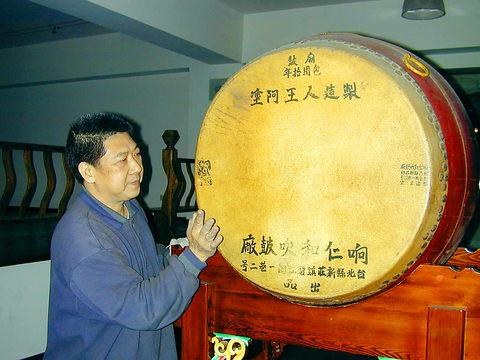Drumming performances at official ceremonies are all the rage at the moment and business leaders have also got in on the action by inviting drumming groups to entertain at their year-end parties.
International drumming groups regularly tour Taiwan and last August the Ten Drum Arts Percussion Group (謝十擊鼓樂團) broke the Guinness World Record by assembling 1,899 people to play drums non-stop for 30 minutes at the same time in Tainan City (台南).
Drums, some with large bronze bells and wooden clappers, are regularly played by Buddhist and Taoist monks at temples every morning and evening. Therefore, it is fair to say that drums are an important part of Taiwanese culture and as a result, the craft of drum making is also flourishing.

PHOTO: LIN JIN-CHI, TAIPEI TIMES
Among the dozen or so drum-making factories in Taiwan, Wang Hsi-kun's (王錫坤) store, the Hsiang-Ren-Ho Piping and Druming Instrument Shop (響仁和吹鼓店), is one of the most interesting.
Located in Sinjhuang (新莊市), Taipei County, the store was set up by Wang's father in 1927. Wang took over the shop in 1973 and many of his hand-made drums have become collectors' items. Buddhist temples, religious centers and professional percussion groups such as Foguangshan (佛光山), the Chungtai Buddhist Temple (中台禪寺), U Theater (優劇場), the Ju Percussion Group (朱宗慶打擊樂團), the Lanyang Dance Troupe (蘭陽舞團) and other performance groups from Japan, Thailand, Malaysia, Nepal and Hong Kong all use Wang's products.
Devi Lee (李黛慧) of U Theater says, "The sound quality of all the drums made by Wang is superior to what we get from other sources. He cares very much about the outer design and color of his drums."
According to Wang, "Good quality drums can only come from a craftsman who puts all his heart and mind into his work. [The drum] has to stand the test of time and the sound quality will improve as it ages."
Wang said the wood to make the drum has to be prepared for a couple of years before it is completely dry and is ready to be crafted.
"We usually use buffalo skin on the drum and it takes a lot of skill to clean up the fur and fat underneath the skin, otherwise the sound quality of a drum deteriorates very quickly."
As Wang's business grew he started his own collection of drums from India, Tibet, China and Africa in the 1980s and set up a 140-ping drum museum in 2001 next to his shop to promote drum culture. The museum has a collection of more than 50 drums and some of them are more than 60 years old, with a few made in unusual shapes and others made from bronze.
Wang has a lot of patience and takes time to explain himself while touring the museum. His dream is to promote drum culture in Taiwan so that someday Taiwan will have its own drum performance style and tradition.
He believes that Japanese drummers have the "samurai spirit" and the drum sound is strong and masculine. In contrast, South Korean drummers tend to dance and to beat drums at the same time, putting an emphasis on entertaining. Taiwanese drummers, however, are still searching for their own unique drumming tradition, he said.
For your information :
What: Hsiang-Ren-Ho Piping and Druming Instrument Shop
Where: 171, Chungcheng Road, Sinjhuang City, Taipei County (
Open: Monday through Saturday, 8:30am to 6pm
Admission: Free
Telephone: (02) 2992 7402, (02) 2991 2468

May 18 to May 24 Pastor Yang Hsu’s (楊煦) congregation was shocked upon seeing the land he chose to build his orphanage. It was surrounded by mountains on three sides, and the only way to access it was to cross a river by foot. The soil was poor due to runoff, and large rocks strewn across the plot prevented much from growing. In addition, there was no running water or electricity. But it was all Yang could afford. He and his Indigenous Atayal wife Lin Feng-ying (林鳳英) had already been caring for 24 orphans in their home, and they were in

On May 2, Chinese Nationalist Party (KMT) Chairman Eric Chu (朱立倫), at a meeting in support of Taipei city councilors at party headquarters, compared President William Lai (賴清德) to Hitler. Chu claimed that unlike any other democracy worldwide in history, no other leader was rooting out opposing parties like Lai and the Democratic Progressive Party (DPP). That his statements are wildly inaccurate was not the point. It was a rallying cry, not a history lesson. This was intentional to provoke the international diplomatic community into a response, which was promptly provided. Both the German and Israeli offices issued statements on Facebook

President William Lai (賴清德) yesterday delivered an address marking the first anniversary of his presidency. In the speech, Lai affirmed Taiwan’s global role in technology, trade and security. He announced economic and national security initiatives, and emphasized democratic values and cross-party cooperation. The following is the full text of his speech: Yesterday, outside of Beida Elementary School in New Taipei City’s Sanxia District (三峽), there was a major traffic accident that, sadly, claimed several lives and resulted in multiple injuries. The Executive Yuan immediately formed a task force, and last night I personally visited the victims in hospital. Central government agencies and the

Australia’s ABC last week published a piece on the recall campaign. The article emphasized the divisions in Taiwanese society and blamed the recall for worsening them. It quotes a supporter of the Taiwan People’s Party (TPP) as saying “I’m 43 years old, born and raised here, and I’ve never seen the country this divided in my entire life.” Apparently, as an adult, she slept through the post-election violence in 2000 and 2004 by the Chinese Nationalist Party (KMT), the veiled coup threats by the military when Chen Shui-bian (陳水扁) became president, the 2006 Red Shirt protests against him ginned up by